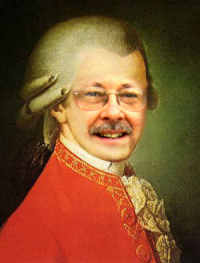A 365-Day Project
"We Are All Mozart"
A project to create
new works and change
the perception of the
music of our time.


 January 27, 2007
January 27, 2007 
In a recent post to an orchestral discussion list, Stephen Adams made an observation about Milton Babbitt. He wrote, "Years ago I was present at a concert where Milton Babbitt appeared in person with the (then) Minneapolis Symphony Orchestra to talk about his new composition. As I recall, he stood on stage and droned on and on (while a highly skilled, highly paid orchestra sat in silence) preening himself on the fact that the orchestra 'couldn't play' his music. When I talked to the oboist afterwards, he was furious: 'I had to count 167 measures in irregular tempo in order to play three notes, two of which aren't on my instrument!'"
The accuracy of this account is doubtful, but composer David Bailey, one of the most insightful writers about music, made this point: "Indeed, there is a lot of music which requires more than a cursory listening to absorb. But that doesn't preclude the fact that it should on the surface exhibit something which draws us in and makes us want to make that extra effort."
I was surprised at David's comment, and considered if it could be true. But no. What music exhibits on the surface differs dramatically with time and culture, and not a little with the quality of the performance.
If I read David correctly, he was suggesting that perhaps Babbitt did not have that surface appeal. But to whom? I loved Babbitt's music. Though I haven't written a Babbitt-like note in years, nor have most composers now fifty years later, his music was an abiding influence in terms of possibilities for both composing and listening. It was always about what could be done, not what had been done. Babbitt was about bravery and daring, and knowing what one was doing in precise detail. He did not suffer compositional fools.
And that Babbitt story has got to be apocryphal, at least in terms of how it was presented. In the 1960s, I was a student at Rutgers, but I would bus to Princeton, posing as a Princeton student just to sit in Babbitt's lectures. I thought of him as the 'used car salesman of new music' -- funny, engaging, warm, always making a fast-talking case for his approach, intolerant of mediocrity, and expecting that music would explore new ground with or without committed performers or listeners. If you didn't care for New York-style hustling, you wouldn't like Babbitt. And remember that Uncle Milty gave us the article "Who Cares If You Listen?" way back in 1958 -- a very different time indeed.
But dumping on Babbitt (as some members of the discussion immediately did) misses the larger picture. The era of high experimentation and acoustic music derived from systems may be behind us, but its influence is so strong that the confounding nature of some of the compositions still can give rise to deriding one of the last century's finest composers. Think about that. It is not sheer happenstance that Babbitt (and Stockhausen, Xenakis, Boulez, Carter, Wuorinen...) were towering figures in mid-century. Despite a lot of revisionist history going around in critical circles (if you read Kyle Gann, you know what I mean), it wasn't some sharp-toothed academic conspiracy. Goodness knows I'm no academic -- and I fell in love with these composers from the 99-cent cutout bin at 2 Guys from Harrison. They were the pinnacle of an era that turned out the musty romanticism, the feckless neo-classicism, and the lazy "wiggly counterpoint" Americanists (thanks to Virgil Thomson for that, who said that writing wiggly counterpoint was as easy as falling off a log) and left us with some serious work to be done. In truth, Babbitt & Co. may not have been the reason I first wanted to become a composer, but they were the reason I have kept at it for forty years. They were thrilling to hear -- and it's not just solipsism talking. Composers uncowed by revisionism will tell you that; in an interview for our Kalvos & Damian radio show, David Del Tredici told us that it was thrilling and sexy (his word) to be writing that way at the time.
For those who rejected these composers then (and now), I think it's likely that without Babbitt and his kindred, there would have been no path to minimalism or turn toward tonality as we know it today. No style has been uninfluenced by him and his contemporaries. The freshness with which we can hear these 'new' sounds of simpler rhythms and tonalities in this century is not based on some long-lost connection to Puccini or pre-serial Schoenberg, but on a half-century of exploring the outer limits of musical possibility and having to make choices, as composers and performers and listeners. Choice freed our artistic sense. Some paths were dead-ends and others were simply unpopular in their time, and some will ultimately become footnoted curiosities.
The orchestra world is conservative, and hostility inside the orchestra to new efforts in composition was always very high. I recall Lukas Foss's article about 1970 where he describes the wreckage done to one of his pieces by (I think) the Berlin Philharmonic, and it sounds very much like that oboist's hostility. Aptly-named 'conservatories' turn out musicians who have studied almost entirely the music of the more distant past, and once their mental bearings are pointed backwards, it takes a force of will (theirs or others') to turn around.
But the situation is changing in a surprising way. I've noticed that young musicians (those about 20 to 35) have rediscovered the music of Babbitt and others and are playing the hell out of it, making it sound passionate and beautiful in a way that the musicians of its own time could not -- because there is no longer a question of technique. They've got it. In the past, performers were often not (like that oboist) willing to look outside themselves, moving past their own circumscribed experiences into new ones presented by the composer. For many of today's performers, Babbitt's music is history and approached with the same respect as Beethoven or Stravinsky. Suddenly, in the hands of performers with freshness and daring and simple fearlessness, what the music exhibits on the surface can draw the listener in and encourage the effort of listening.
As I said, few composers have written Babbitt-like music in years, but that doesn't lessen its artistic significance during its own time. And when well-performed, it can draw gasps of wonder at its beauty.
* * *
Today's work is a piece due tomorrow, for mezzo-soprano, violin, viola and piano. With the setback of engraving, article writing, and the CMA show, the pressure is high and I'm happy to have two days to work on it. Not so productive as it should be.
Thursday Coarse Salt was composed for Michael Straus, an adventurous saxophonist presently in Baltimore. Originally a composition planned for tenor, Michael changed his request to soprano, and that gave me a chance to work on the most fluid of saxophones and the one that is least heard in the literature. My own first experience with the soprano was Shostakovich's The Age of Gold, with its lustrous, unforgettable solo.
For this commission, the idea was to push the saxophone forward from its first notes -- an upward-moving motive that asks Michael to overblow, creating a dirty sound. Start-and-stop figures jaggedly rise and cascade, all reflecting the rhythmic stutter in the first measure. After an increase in speed and a reduction in jaggedness, the sax comes to a brief pause, then plunges into a set of rising improvisational-sounding figures that surround a rising and falling (and often just implied) chromatic line that is stretched out from the opening motive. It also encompasses the theme itself in several fragmented reappearances, returning to it in nearly whole form for the conclusion.
It's five minutes of madness. After reading through it, Michael wrote, "the ass kicking has started." You can find the score here and listen to a demo without the overblowing effects (or the anticipated energy).
* * *
Nothing could contrast more with a frenetic sax solo than Canary Burton's commission for a lullaby for voice and piano. She didn't specify a text, so I decided to make it a cello solo that could be done as a vocalise. (And talk about un-Babbitt-like! Oh. My. Gawd.)
Avoiding triviality turns out to be a challenge not only of writing a lullaby, but also of this project itself. "Hey, this worked, I'll just do it again!" It was okay for Bach and Handel, but for me? True enough, I steal from myself -- but not for "We Are All Mozart." It has to be real, original, productive every day. And so I began in the middle and with -- please don't hold it against me -- a chord progression. Not a typical chord progression, of course, but a peculiar one that I experimented with nearly forty years ago in a miniature setting of Jacques Prévert's Le Jardin. This was different, being elongated and infused with those four decades of experience. But it was still a chord progression.
Above it was created a simple but very deceptive melody, with chromatic cadences that fit a voice in such a way that it emulates the accidental tonal shifts that 'private' singers make in humming tunes. Then the melody was repeated three more times, working to the front (exposed as an unaccompanied solo, and then with simple chords) and the back (again with simple chords, but different ones). With the melody itself shifting its place in the cello's voice, it becomes a self-modulating, tonality-free tune.
Simple but deceptive. Try humming it. The score is here and a demo version is here..
* * *
The structure of tomorrow's piece is ready, and the material is laid out in my mind. The glory of having two days!

Two days is a good thing indeed. The temperature dropped to 16 below last night, and I was up early splitting wood and piling it in the kitchen. Yes, that's snow sticking to the wood -- but it splits with a feather touch when the temp drops under 10 below.